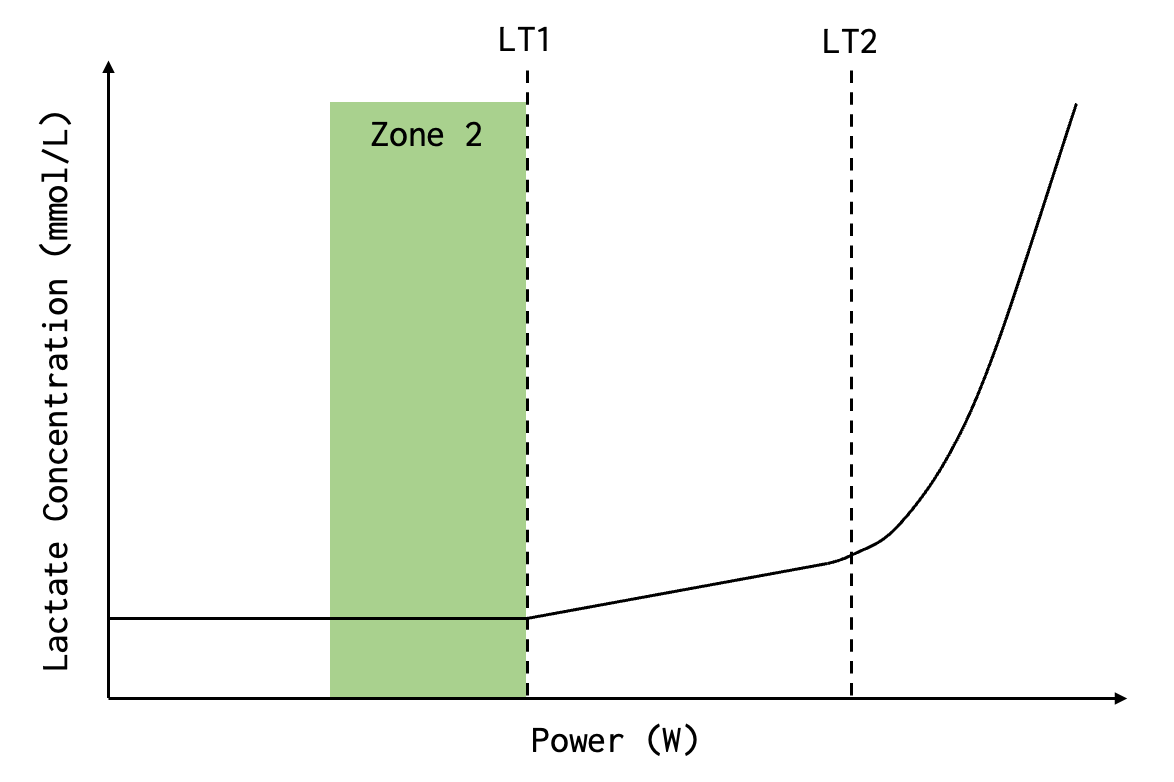If anyone tells you that they are “non-reactive to zone 2”, meaning their body and certain muscle fibers do not adapt well to below blood lactate threshold (z2) training, then it is a volume problem.
It’s almost physiologically impossible to not become aerobically more fit from training below your blood lactate threshold.
(To the left of LT1 = Below Blood Lactate Threshold)
The major hump that newer runners have a hard time getting over is what I call the
”volume gap”. The gap comes from what is known in your head of what can actually be done in a week. This is *especially* true for those who are making the transition from the weight room to the road.
For example, a solid week in the gym can simply be 4 days x 45 minutes. That’s 3 hours of work, which can be fine in the weight lifting world.
But extrapolating this out to the distance world, meaning anything over the mile distance, requires much more work to be done. For someone using the normal “bro split” in the gym, the time commitment is not that large for a pretty decent outcome. This creates a fake ceiling on work per week, it seems unneeded or even impossible that your hours on the road will have to double what they were in the gym in order to make high end (for your ability) endurance gains.
The most common Strava chart I see from new runners who reach out to me are those who run 2-4 hours a week, ranging in the 15-20 mile zone. While it’s totally fine, and efficient even to run in this range, but you will not see massive gains compounding from race-to-race if you are training for a specific distance.
The above scenario is what usually happens when someone tells me “zone 2 doesn’t work”. They take the same hours they ran per week in zone 3-4, and just run them in zone 2 instead. This is incorrect! As intensity comes down, volume must go up. It happens mostly with former gym bros and girls, who get “stuck” in the 45 min 4x a week routine.
The band-aid has to be ripped off your current volume ceiling. Your heart isn’t going to explode and your muscles aren’t going to disappear if you start running 6 hours a week.
Volume & Stress
But this leads us down another road: The problem of making time appear out of thin air.
I apologize for continuously showing Coros features, but I am really enjoying their UI—this is not a paid ad. I am sure Garmin has a similar feature I am not aware of.
Regardless, using a feature such as Coros’ Stress score allows you to understand what is stressing you out most in life and when. The way this particular score works is pinging your heart rate and HRV every 5 minutes throughout the day. The watch must be worn for at least 16 hours in order to get a score.
Why this is important is that many people do not understand just *how* stressful their work or life may be. They may be stressed all day from their boss, then go to “blow off steam” on a hard run. This is fighting a stressful act with an even more stressful action! Not great at all for your body and heart health.
Being able to look back on your metrics from a 30,000ft view and understand “maybe I do hate my job”, or worse, “maybe I am not enjoying life with my current partner”. Whatever the case may be, these running metrics go deeper than just fitness itself.
Once you are able to clear out stress from your normal life, it clears up time & ability for you to be able to train more efficiently and under much less stress. Less outside stress during training = better performance.
As you can see, endurance is an intertwined discipline, requiring a certain “chill” athlete who is at peace with their current state and where they are going. Not that they are completely content, but understand what can be *right now* and what is worth stressing over.
The gains in life and fitness will come, the stress can wait!
Have a great Sunday!
PS if you need help with your training, shoot me questions (if a paid subscriber) via Substack and if you want specific hands-on training with daily communication then click the link below!







Speaking as someone who really likes to blow off steam by going on a hard run (and then getting hurt), this is a great post. I appreciate all the reminders about zone 2 and focusing on volume. I've seen many people who are that 'chill' athlete excel where my aggression and enthusiasm gets me inconsistent results. I love reading these philosophical posts!